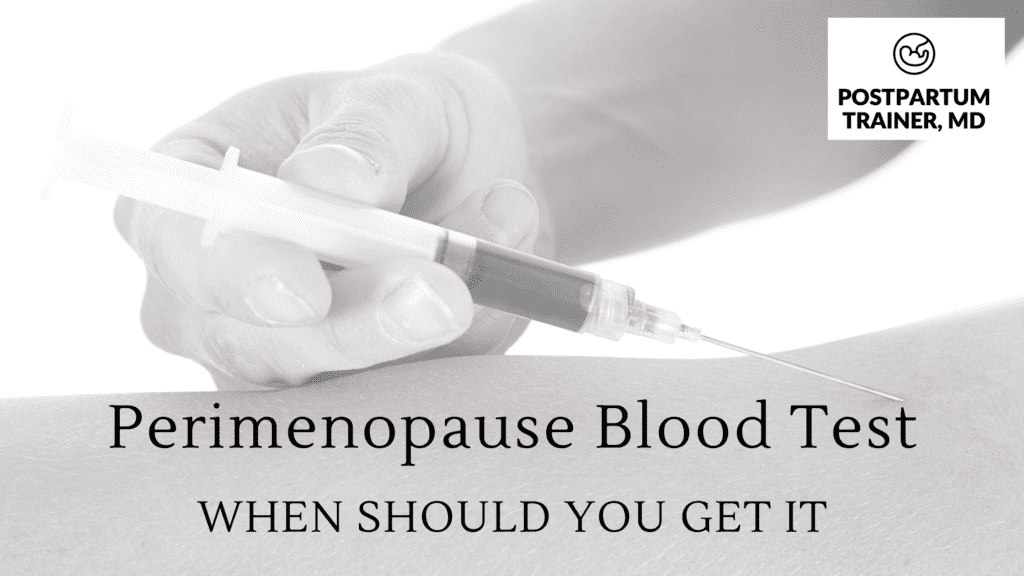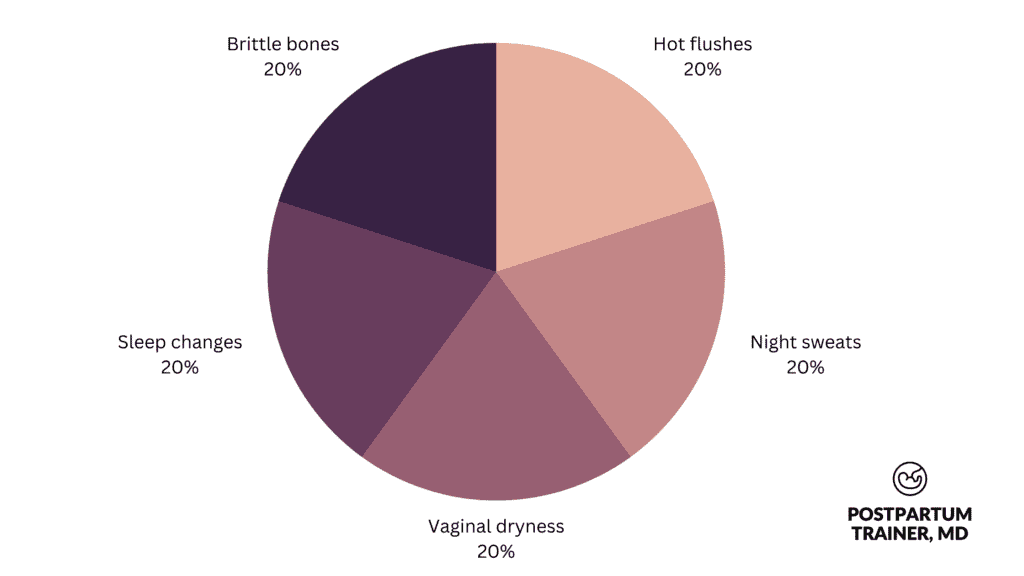Have you noticed changes inside your body and wondered if this is perimenopause?
Well, if you are between the ages of 40 and 55, it’s possible.
Fortunately, to make a diagnosis of perimenopause, there are hormone levels that we can measure in your blood.
After reading this post, you will learn the following:
- Exactly what blood test your healthcare provider can obtain to confirm you are in perimenopause,
- The best time to have this blood test, and
- The symptoms of low estrogen.
Let’s get started.

Can a hormone blood test detect perimenopause?
Yes, in clinical practice, there are simple laboratory tests you could have done to determine if you are in perimenopause.
The hormone test is obtained by a blood sample, giving you results in 24-48 hours.
What hormones are tested?
The essential hormones tested in your blood are FSH, or follicle-stimulating hormone, and estrogen in the form of estradiol.
If your FSH tests are high and your estradiol levels are low, you are likely in perimenopause.
What FSH level indicates perimenopause?
The normal range of FSH is between 1.5-12.4mIU/mL.
If your FSH levels are high, above 30 – 40mIU/mL, you are likely in perimenopause.
The follicle-stimulating hormone rises because your body is responding to low estrogen levels (1).
Unfortunately, as you approach menopause, your estrogen levels begin to drop as very few eggs are left in your ovaries.
As estrogen levels decline, the brain ramps up the production of FSH to raise the estrogen level.
Is FSH always high?
Follicle-stimulating hormone, or FSH, is almost always high in menopause. However, your FSH can be increased in several other conditions as well, including:
- Premature Ovarian Failure or primary ovarian insufficiency
- Ovarian tumor, and
- Chromosomal anomalies like Turners Syndrome or Monosomy X
Therefore, if your FSH level is high, it is a good idea to speak with your healthcare professional to rule out any of these other conditions.
What are the symptoms of low estrogen?
The most common symptoms of low estrogen include:
- hot flushes
- night sweats
- vaginal dryness, and
- sleep problems
There are many other less common symptoms of low estrogen levels, including recurrent yeast infections, urinary tract infections, mood changes, trouble concentrating, forgetfulness, loss of taste, and weak bones.
How Do You Combat The Symptoms of Low Estrogen?
You can combat the symptoms of low estrogen by maintaining a healthy diet and engaging in regular exercise.
For example, limited data exist that consuming phytoestrogens (such as soy) may help reduce symptoms of hot flushes.
In addition, exercise such as strength training can help decrease your risk of cardiovascular disease, osteoporosis, and worsening mental health.

If these lifestyle changes do not improve your symptoms, you may be a candidate for hormone replacement therapy.
Are LH levels high in perimenopause?
Yes, your LH or luteinizing hormone levels also increases during perimenopause.
The LH level increases because the luteinizing hormone triggers ovulation, which is the release of an egg from your ovary.
During the menopausal transition, fewer eggs are in your body, causing your pituitary gland to increase the production of LH so that ovulation can occur.
When is the Best time to have a blood test for perimenopause?
The best time to have hormone testing is after you have been experiencing symptoms of perimenopause, including but not limited to the following:
- 6-12 months of irregular menstrual periods,
- hot flashes, and
- vaginal dryness,
Some women may also experience mood swings, weight gain, and sleep disturbance.
What are the first signs of perimenopause?
The first sign of perimenopause is irregular menstrual cycles.
Cycles tend to become shorter than usual due to the high FSH.
Another common symptom of perimenopause is hot flashes.
As estrogen levels drop, the hypothalamus (which regulates body temperature) becomes more sensitive to changes in body temperature.
What if you have symptoms, but your blood tests are normal?
If you have perimenopausal symptoms, but your FSH and estradiol level are normal, you are likely just in the early stages of the menopausal transition.
You do not need a blood test to be diagnosed as menopausal or perimenopausal.
You are likely perimenopausal if you are symptomatic, experiencing irregular periods, hot flashes, night sweats, fatigue, and vaginal dryness.
Be sure to speak with your doctor to ensure no other medical conditions are causing your symptoms.
What Is The Accuracy Of The Menopause blood test?
While blood tests are generally accurate in diagnosing menopause, there can be some false-negative results.
A false-negative means that the test indicates you are not in menopause when you are. False-negative results are more likely to occur if you are in the early stages of perimenopause.
If you are experiencing symptoms of menopause, and your FSH level is high, you are most likely going through menopause. In this case, the blood test would be considered accurate.
Always speak with your healthcare provider to understand what treatment options are available.
Is It Possible To Be In Early menopause?
The average age of menopause in the United States is 51.
However, some women may experience premature ovarian insufficiency, which is when the ovaries stop functioning before the age of 40.
Unfortunately, we don’t always know why some women go into premature menopause, but possible causes include:
- Fragile X
- Autoimmunity against your adrenal glands
- Other genetic abnormalities
Final Words On Perimenopause Testing
With two simple blood hormone tests, we can quickly and effectively make a diagnosis of menopause.
Now I want to hear from you.
Are you experiencing perimenopause symptoms?
Did you have a blood test?
Comment below and let me know.
Related Articles:
- How To Prepare For The Menopausal Transition
- A Complete Menopause Exercise Plan (To Preserve Muscle & Bone Mass)
Get Four Free Workouts To Help Strengthen Your Pelvic Floor & Heal Your Mommy Tummy!

Brittany Robles, MD, MPH, CPT
Brittany Robles is a full-time OBGYN physician, a NASM certified trainer, and a prenatal and postnatal fitness specialist. She holds a Master of Public Health degree in maternal health with a special interest in exercise and nutrition. She is also the co-author of The White Coat Trainer. Learn more about her here.
Sharing is Caring – Send This To A Mom In Need!
References:
- Burger HG. Diagnostic role of follicle-stimulating hormone (FSH) measurements during the menopausal transition–an analysis of FSH, oestradiol and inhibin. Eur J Endocrinol. 1994 Jan;130(1):38-42. doi: 10.1530/eje.0.1300038. PMID: 8124478.
- Peacock K, Ketvertis KM. Menopause. [Updated 2022 Aug 11]. In: StatPearls [Internet]. Treasure Island (FL): StatPearls Publishing; 2022 Jan-. Available from: https://www.ncbi.nlm.nih.gov/books/NBK507826/
- Chen MN, Lin CC, Liu CF. Efficacy of phytoestrogens for menopausal symptoms: a meta-analysis and systematic review. Climacteric. 2015 Apr;18(2):260-9. doi: 10.3109/13697137.2014.966241. Epub 2014 Dec 1. PMID: 25263312; PMCID: PMC4389700.
